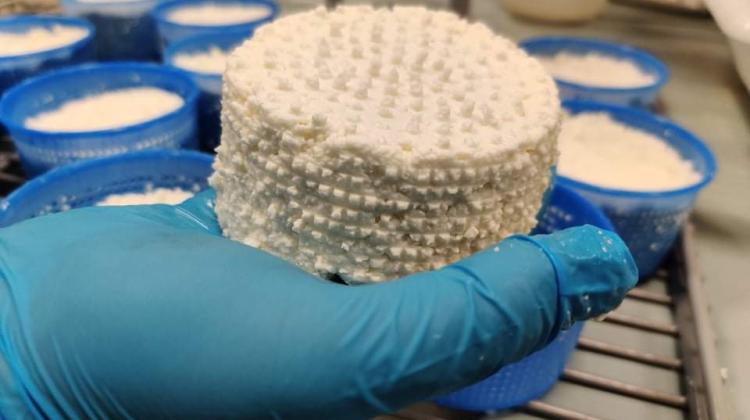Scientist improves bakery products for people with Irritable Bowel Syndrome
 Photo from press release
Photo from press release
Up to one in five people may suffer from irritable bowel syndrome (IBS).
Symptoms can be mitigated through a diet that eliminates certain compounds found in food. A scientist from the Institute of Animal Reproduction and Food Research of the Polish Academy of Sciences in Olsztyn proposes methods for making bakery products so that they retain their nutritional value while being tolerated by people suffering from this digestive disorder.
'The healthiest bakery products recommended by nutritionists are often the least beneficial for people with irritable bowel syndrome. An example is whole-grain rye bread, rich in dietary fibre, which, however, is not recommended for people with this disorder. Fortunately, nowadays, thanks to acquired knowledge and appropriate technological processes, it is possible to produce nutritionally valuable bread that will not exacerbate gastrointestinal symptoms,’ says Dr. Marianna Raczyk of the Nutrigenomics Scientific Group at the Institute of Animal Reproduction and Food Research PAS in Olsztyn.
The conclusions are presented in an overview article that outlines the world’s most latest reports on the subject, published in Critical Reviews in Food Science and Nutrition. The authors are Dr. Raczyk and Dr. Marcus Schmidt of the Federal Research Institute of Nutrition and Food at the Department of Safety and Quality of Cereals in Germany.
Irritable Bowel Syndrome (IBS) is one of the most common gastrointestinal disorders, for which a proper diet is crucial. A group of carbohydrates called FODMAP - fermentable oligo-, di-, monosaccharides and polyols - is among the factors that exacerbate the symptoms of this chronic disease.
This is a group of fermentable sugars and alcohols that the body is unable to break down and absorb in the small and large intestines. These are the ones that produce gases, causing, among other things, bloating, diarrhoea, abdominal pain and other ailments in people with IBS.
One of the main sources of FODMAPs in the diet are bakery products, particularly whole-grain bread. 'Cereals high in fructans, such as wheat, barley and rye, should be significantly reduced in a low FODMAP diet, hence it is difficult to choose the right bread for IBS patients,’ says Raczyk.
People with IBS face the question of whether to eat whole-grain bread and worsen their well-being, or choose light bread which is less nutritious.
'In order to improve the quality of life for IBS patients, it is therefore necessary to provide alternative, low FODMAP products, while maintaining nutritional values,’ says Raczyk, adding that it is not possible to completely eliminate FODMAP compounds from food, but they can be reduced to minimum threshold values
The authors of the publication focused on bakery products. Having collected the latest world reports on the subject, they propose the following methods to reduce the FODMAP content in products: the use of yeast fermentation and fermentation with lactic acid bacteria, appropriate selection of raw materials, suitably modified dough fermentation process and the use of additional enzymes or microorganisms that eliminate unfavourable compounds.
'These technologies are mostly known to bakery product manufacturers, but it is necessary to improve them and use them in a controlled manner to preserve the maximum amount of nutritional value,’ says Raczyk
You can also control the FODMAP content yourself in the production of home baked goods, by choosing the right raw materials and the right dough kneading and fermentation process. For details, see the source article.
The range of low-FODMAP foods on the food market is expanding. 'Manufacturers are working all the time to improve and expand them, as there is growing interest by consumers themselves but also by catering companies offering boxed diets specifically for people with IBS,’ Raczyk says.
Today, these products are slightly more expensive than the conventional ones. 'However, I would compare this to gluten-free products. Just a few decades ago they were a novelty, and today they are very popular and often at a price comparable to conventional ones. I suppose it will be similar with low FODMAP products
'Irritable bowel syndrome affects about 10-20 percent of the population. The number of people diagnosed with the condition increases every year. Patients with IBS need the support of dieticians to prepare the right diet for them, so it is estimated that the demand for low FODMAP products will increase,’ says Dr. Raczyk.
Find out more in the source article. (PAP)
PAP - Science in Poland, Agnieszka Libudzka
ali/ bar/ kap/
tr. RL
Przed dodaniem komentarza prosimy o zapoznanie z Regulaminem forum serwisu Nauka w Polsce.


















